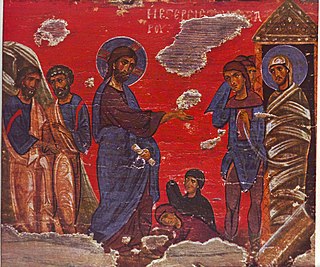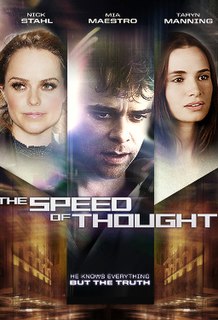
Time Enough for Love is a science fiction novel by American writer Robert A. Heinlein, first published in 1973. The work was nominated for the Nebula Award for Best Novel in 1973 and both the Hugo and Locus Awards in 1974.
Lazarus Long is a fictional character featured in a number of science fiction novels by Robert A. Heinlein. Born in 1912 in the third generation of a selective breeding experiment run by the Ira Howard Foundation, Lazarus becomes unusually long-lived, living well over two thousand years with the aid of occasional rejuvenation treatments. Heinlein "patterned" Long on science fiction writer Edward E. Smith, mixed with Jack Williamson's fictional Giles Habibula.

"Jesus wept" is a phrase famous for being the shortest verse in the King James Version of the Bible, as well as many other versions. It is not the shortest in the original languages. It is found in the Gospel of John, chapter 11, verse 35.

Sarah Bolger is an Irish actress. She has starred in the films In America, Stormbreaker, The Spiderwick Chronicles and Emelie. She is also known for her role as Lady Mary Tudor in the TV series The Tudors, for which she won an IFTA award, and for her appearances as Princess Aurora in Once Upon a Time.
"The Alternative Factor" is the twenty-seventh episode of the first season of the American science fiction television series Star Trek. Written by Don Ingalls and directed by Gerd Oswald, it first aired on March 30, 1967.

Lazarus of Bethany, also known as Saint Lazarus or Lazarus of the Four Days, venerated in the Orthodox Church as (Righteous) Lazarus the Four Days Dead, is the subject of a prominent miracle of Jesus in the Gospel of John, in which Jesus restores him to life four days after his death. The Eastern Orthodox and Roman Catholic traditions offer varying accounts of the later events of his life.

The raising of Lazarus or the resurrection of Lazarus is a miracle of Jesus recounted only in the Gospel of John in which Jesus brings Lazarus of Bethany back to life four days after his burial. In John, this is the last of the miracles that Jesus performs before the Passion and his own resurrection.

The Lazarus Heart is an original novel by American writer Poppy Z. Brite, set in the universe of The Crow. It was published in 1998 by Harper Prism. Like the majority of Brite's fiction, The Lazarus Heart is set in New Orleans.

The Speed of Thought is a 2011 thriller film written and directed by Evan Oppenheimer and starring Nick Stahl, Taryn Manning, and Mía Maestro.
Boondocks are remote, usually brushy areas. It may also refer to:

The Lazarus Child is a 2005 American drama film directed by Graham Theakston. It was filmed in Canada and the United Kingdom.

Mark David Duplass is an American film director and producer, actor, musician, screenwriter, and author. He was a co-star of the FX television series The League. He is the brother of filmmaker Jay Duplass, and together the brothers started the film production company Duplass Brothers Productions, and have directed films such as The Puffy Chair (2005), Jeff, Who Lives at Home (2011), and The Do-Deca-Pentathlon (2012). Mark and Jay co-created the HBO television series Togetherness in 2015. Mark co-wrote, produced and starred in the 2014 horror film Creep alongside Patrick Brice.
Luke Dawson is an American screenwriter who is best known for his scripts of the remake of Shutter and the Thriller film The Lazarus Effect.
David Gelb is an American film director and co-founder of Supper Club, a production company. He directed the 2011 documentary Jiro Dreams of Sushi. In 2015, he directed The Lazarus Effect. He is also the creator of the Netflix series Chef's Table.

Lazarus is a musical with music and lyrics composed by David Bowie, and a book written by Enda Walsh. First performed at the end of 2015, it was one of the last works Bowie completed before his death on 10 January 2016. The musical is inspired by Walter Tevis's novel The Man Who Fell to Earth. Bowie previously starred in the 1976 film adaptation of the same name, directed by Nicolas Roeg.
This page is based on this
Wikipedia article Text is available under the
CC BY-SA 4.0 license; additional terms may apply.
Images, videos and audio are available under their respective licenses.















